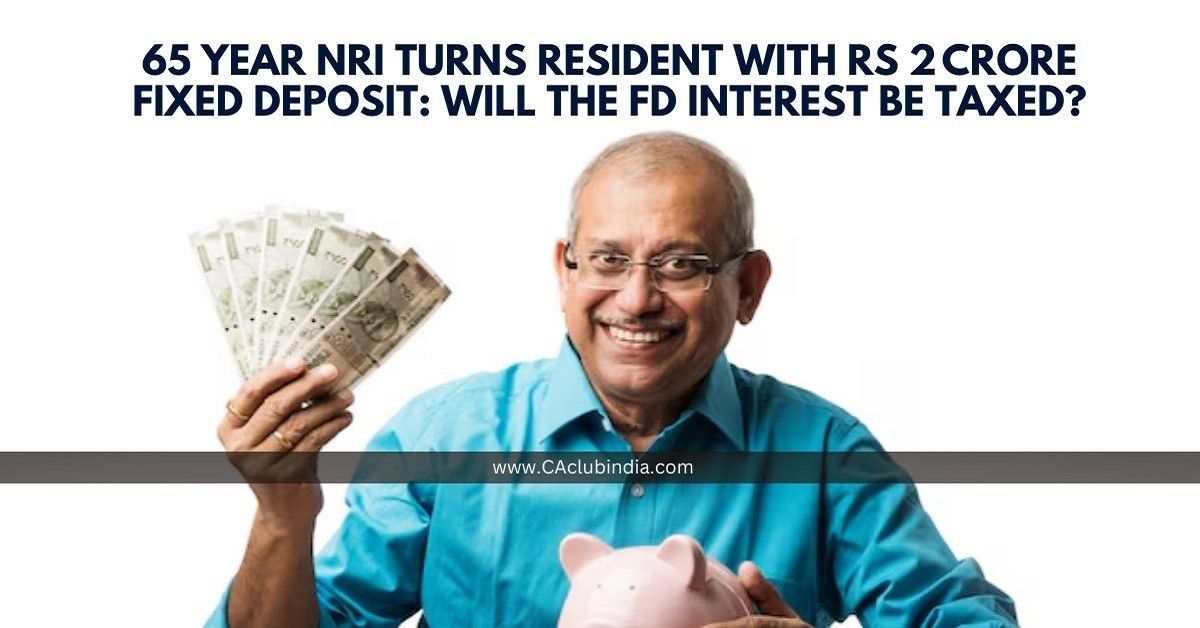As a 65-year-old NRI transitioning to a resident Indian with a Rs 2 crore fixed deposit, your financial landscape is about to change especially when it comes to taxes.
Many returning NRIs are caught off guard when their once tax-free NRE fixed deposits suddenly attract tax under Indian laws.

Residential Status Criteria (As per Income Tax Act)
| Category | Conditions | Status |
| Resident | -Stayed in India for 182 days or more during the financial year OR- Stayed for 60 days or more in the year AND 365 days or more in the preceding 4 years | Resident |
| Resident and Ordinarily Resident (ROR) | Qualifies as Resident AND- Has been Resident in 2 out of 10 previous years AND- Stayed in India for 730 days or more in last 7 years | ROR (Global income taxable) |
| Resident but Not Ordinarily Resident (RNOR) | Qualifies as Resident but does not meet ROR conditions | RNOR (Only Indian income taxable, foreign income not taxed) |
| Non-Resident (NRI) | Stayed in India less than 182 days in the financial year | NRI (Only Indian income taxable) |
NRI to Resident - What Changes?
When an NRI becomes a resident and ordinarily resident (ROR) under the Income Tax Act, global income becomes fully taxable in India. This includes:
- Interest from NRO, NRE, and regular FDs
- Income from overseas sources
- Any pension or annuity
In this case, once a NRI becomes a resident, the FD interest income will be taxable, unlike the tax-exempt status enjoyed on NRE FDs when you were an NRI.
Interest Income Calculation on Rs 2 Crore FD
Assuming a 7% annual interest, the yearly interest on Rs 2 crore = Rs 14,00,000.
This interest will now be added to your total taxable income and taxed as per your applicable slab.
Senior Citizen Tax Benefits (FY 2025-26)
| Particulars | Details |
| Basic exemption limit | Rs 3,00,000 |
| 80TTB deduction | Up to Rs 50,000 on interest income from FDs & savings |
| Slab rates (Old Regime) | 5% to 30% over Rs 3 lakh |
Assuming there is no Income except Income from FD Interest
| FD Interest = Rs 14,00,000 Less: 80TTB = Rs 50,000 Taxable income = Rs 13,50,000 |
And Tax liability shall be :
| Slab | Tax Rate | Taxable Amount | Tax Payable |
| Rs 0 - Rs 3,00,000 | Nil | Rs 3,00,000 | Rs 0 |
| Rs 3,00,001 - Rs 5,00,000 | 5% | Rs 2,00,000 | Rs 10,000 |
| Rs 5,00,001 - Rs 10,00,000 | 20% | Rs 5,00,000 | Rs 1,00,000 |
| Rs 10,00,001 - Rs 13,50,000 | 30% | Rs 3,50,000 | Rs 1,05,000 |
Total Income Tax = Rs 10,000 + Rs 1,00,000 + Rs 1,05,000+Rs 8,600(cess) = Rs 2,23,600
Under the new tax regime,
Taxable Income will be Rs 14,00,000
Since the section 80TTB deduction is not available.
| Slab | Tax Rate | Taxable Amount | Tax Payable |
| Rs 0 - Rs 3,00,000 | Nil | Rs 3,00,000 | Rs 0 |
| Rs 3,00,001 - Rs 6,00,000 | 5% | Rs 3,00,000 | Rs 15,000 |
| Rs 6,00,001 - Rs 9,00,000 | 10% | Rs 3,00,000 | Rs 30,000 |
| Rs 9,00,001 - Rs 12,00,000 | 15% | Rs 3,00,000 | Rs 45,000 |
| Rs 12,00,001 - Rs 15,00,000 | 20% | Rs 2,00,000 | Rs 40,000 |
Total Tax Liability =Rs 1,30,000 + Rs 5,200 = Rs 1,35,200
TDS on FD Interest
Banks will deduct TDS @10% if annual interest exceeds Rs 40,000 and Rs 50,000 for senior citizens.
Is Tax Filing Required?
Yes, since the total income exceeds Rs 3,00,000 (senior citizen limit), Filing in ITR-1 or ITR-2, depending on sources of income.
Key Takeaway
- FD interest is taxable once NRI status changes to resident (ROR).
- NRE FDs lose tax exemption after returning to India.
- At 65, you get senior citizen tax benefits like Rs 3L exemption and Rs 50K 80TTB (Old Regime only).
- Old regime tax: Rs 2.23L | New regime tax: Rs 1.35L - better if no deductions.
- TDS @10% applies if interest > Rs 50,000/year.
- File ITR if income crosses Rs 3L.
FAQs
Is NRE FD taxable after becoming a resident?
Yes, NRE FDs lose tax-exempt status once you become a resident.
How much interest on FD is tax-free for senior citizens?
For a senior Citizen the TDS limit is RS 50,000 and upto Rs 50,000 TDS is exempt.Under the old regime section 80 TTB a deduction of Rs 50,000 is also available.
Which ITR form to use for FD interest?
ITR-1 if assessee has only interest/pension; ITR-2 if assessee has any foreign income or assets.
What if I still have income abroad?
As a resident, foreign income is taxable unless covered under DTAA (Double Taxation Avoidance Agreement).










 CAclubindia
CAclubindia
